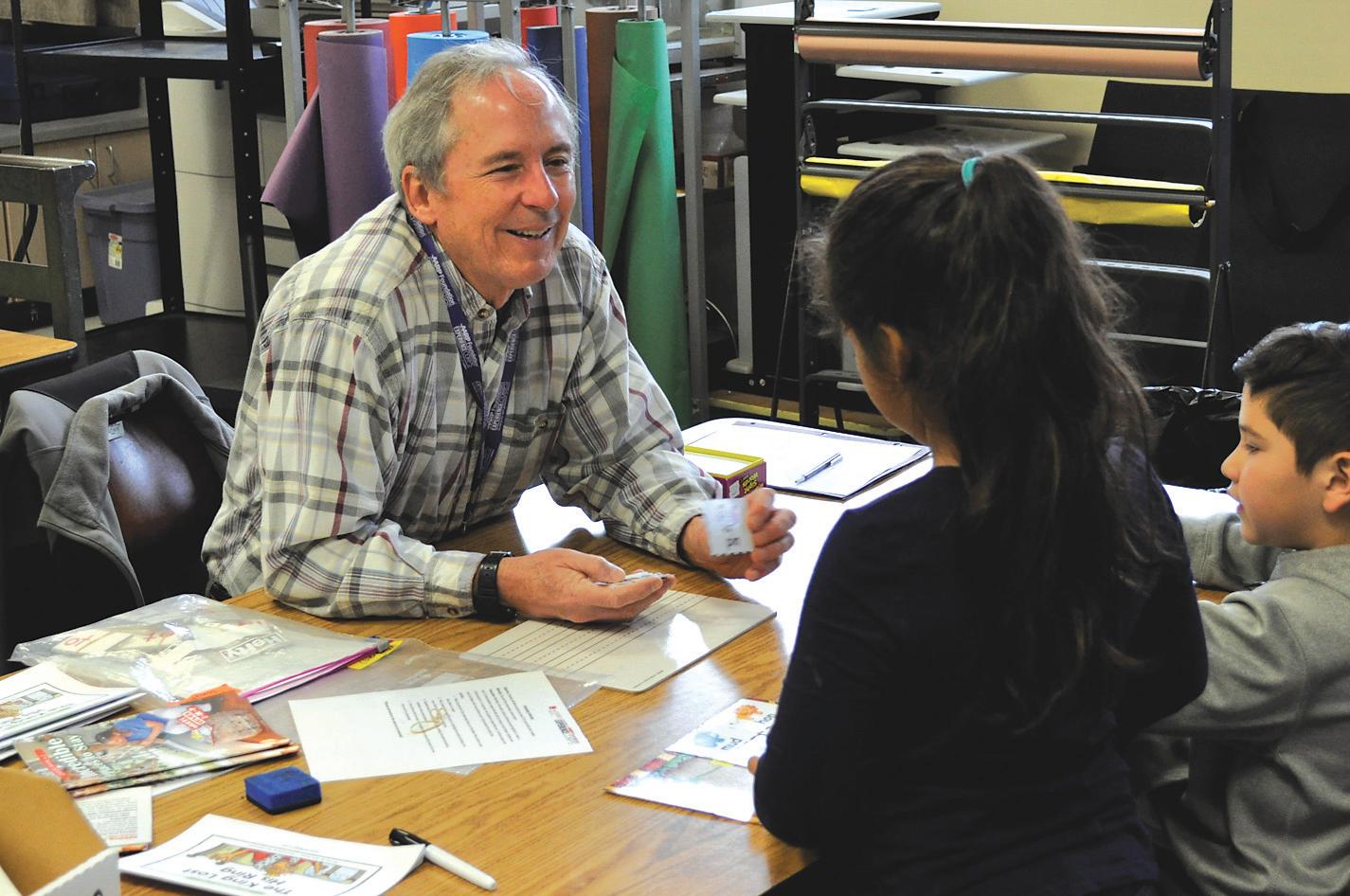
8 minute read
Publisher's Desk
THE ART OF CARING
A DECADE OF MCKINLEY PARK STEWARDSHIP ENDS
Cecily Hastings and Lisa Schmidt Photo by Aniko Kiezel
Ten years ago, fi lled with energy, optimism and can-do spirit, Lisa Schmidt and I took on the monumental job of saving the Clunie Community Center and McKinley Rose Garden in McKinley Park.
We founded a nonprofi t called Friends of East Sacramento in 2010. That was the easy part. The rest of the story is an adventure in generosity, volunteerism and community pride, along with the darker parts of human nature, from petty jealousy and troublesome neighbors to crime.
CH CH
By Cecily Hastings Publisher’s Desk
Faced with drastic cuts to city park budgets, the rose garden and community center faced a crisis after the Great Recession in 2009. The center was headed for closure. The city was unwilling to spend $100,000 a year to keep it open. There were no funds for much-needed maintenance.
Clunie housed the neighborhood library, which would shut down if the building closed. Lisa was on the board of the Friends of the McKinley Library. She was heartbroken.
I lived on 33rd Street across from the McKinley Rose Garden. Once a vibrant regional treasure with two full-time park workers, the garden was overgrown with weeds and nutgrass. More than half of the 1,200 roses were dead.
City Council member Steve Cohn lobbied the city to replace the irrigation system and pave the pathways for ADA compliance. But there were no funds for the garden. Our goal was to save and restore these treasures, the center and garden together.
Luckily, the city had a forwardthinking parks director named Jim Coombs. He and Cohn encouraged us to take over the stewardship job. Without them, our entrepreneurial approach would not have happened.
Bradley Elkin, our pro bono attorney, guided us through negotiations with the city, always protecting our interests. Talks were contentious. The city attorney’s offi ce made unreasonable demands. But we prevailed and more than honored our agreement for a decade, despite the city often acting as a selfi sh and thoughtless partner.
We needed to raise signifi cant money fast to transition into our nonprofi t. Inside Sacramento published a painting of the community center on its cover with the headline, “Is this place worth saving?” Within a week, we raised $40,000, mostly from the small business and real estate community. Some like Sheree Johnston, who owned East Sacramento Hardware, continued her support for a decade.
We needed another $100,000, which we raised from individuals and businesses. Mayor Kevin Johnson helped wrangle corporate donations. We refi nished fl oors, installed new carpets, painted and restored woodwork throughout, upgraded lighting, purchased new furnishings and decorated the walls with historic McKinley Park photos. The newly restored facility and our Inside Sacramento marketing efforts quickly brought in event rentals, including wedding receptions and memorials. By opening the building on Sunday, we attracted a church that moved their services to Sunday mornings. The congregation then funded improvement to the Grand Hall. Other faith-based groups followed when they found a beautiful and safe place to worship.
Rose garden funding took another direction. My neighbor and friend Sue Watkins introduced me to her father,
Ron Watkins. He recalled when his folks moved to Sacramento and the family camped in the park while their home was built nearby.
As a retired real estate developer, Ron reviewed our business plan and funded the restoration of the garden and its 27 worn-out benches. He covered maintenance costs for the fi rst two years and funded a gazebo built by iron artist Bill Kuyper. Ron, who died in 2016, gave more than $175,000 to make the garden beautiful again.
As rental fees for weddings and events brought in cash, we funded a lawn service. I developed our volunteer program to care for the roses. This was a big job, especially at fi rst. We planted 600 new bushes with guidance from the local rose society.
We recruited and trained volunteers, mostly though outreach using stories and donated ads in Inside. The roses thrived. Hundreds of volunteers became regulars. Eventually, we had money to hire two amazing garden managers, Lyn Pitts and Nisa Hayden.
From the start, Lisa and I decided how our skills and personalities would work together. We pledged to never accept salaries.
Lisa took charge of bookkeeping and staff development, plus facility management and event organization. We hired retired police offi cer Joe Pane as facility manager. Joe set the tone for success with skill and spirit. In 10 years, he trained and mentored 30 young men in event management.
My role included branding and marketing the center and rose garden. Experience with interior design and construction allowed me to develop restoration and improvement plans and work with contractors.
Designer Claudia Bordin was a tremendous help. She secured costeffective design solutions. Our concrete contractor refused payment when we vowed to make Clunie available for 12step groups. He said a 12-step program saved his life.
City Council member Jeff Harris was incredible at resolving confl icts with the city. His advocacy was critical when certain city staff decided our work threatened their domain. His appreciation made up for the city’s lack of gratitude. He recently told folks that our volunteer work provided our city a gift valued in the millions of dollars.
Those were happy memories. Unfortunately, our story doesn’t end with them.
Early on, for safety reasons we limited Clunie restrooms to library and rental guests. But several self-described “neighborhood preservationists” told the city our policies endangered elderly people and children. In fact, the restrooms were perfectly safe—and cleaned daily.
When we watered new rose bushes, the city received complaints we wasted water in a drought. High school families loved to visit the garden and take photos on prom night. Some proms confl icted with wedding rentals on spring weekend evenings. The teens were understanding, but a few parents were outraged their darlings couldn’t have full access to the garden. We had to hire security for those nights.
Pandemic lockdowns brought headaches and heartaches. The two-year McKinley Water Vault construction was underway yards from the garden. City project manager James Yorita was a prince. What could have been a disaster became a blessing under his leadership.
The city urged us to add the Shepard Garden and Arts Center to our portfolio last year, when the volunteer managers quit. This was after the “neighborhood preservationists” objected, claiming we had a mysterious sweetheart deal.
A decade ago, there were no homeless people or criminals in McKinley Park. In recent years, the situation deteriorated. From cleaning human feces and drug paraphernalia in rose beds to being threatened with lawsuits when we moved encampment belongings before a wedding, our operation was terribly impacted, as was most of the Alhambra Corridor.
Our offi ces were broken in many times. Both the garden’s iron arches and the Gary Lee Price bronze statue in the Clunie lobby were stolen. Public outrage and police efforts paid off. The works were returned.
A former neighbor of mine on 33rd Street harassed us, claiming we allowed rampant nutgrass weeds in the garden—after we spent thousands of dollars to eradicate the weeds. Next, she claimed I improperly used my home offi ce. The city tagged her as a chronic false complainer.
But she didn’t stop. She fi led an ethics allegation that we misused city funds—bizarre, because we received no city funds and reported annually to the city.
After an investigation and two public hearings, the city declared her claims without merit. Undaunted, she referred her complaint to the state Department of Justice, triggering an audit of our nonprofi t. Legal fees and preparation approached $10,000. The outcome: no merit.
These were hard lessons. Despite the love and generosity of volunteers and community leaders, we learned evil people exist to sidetrack our efforts. Our motto and favorite laugh is the old line, “No good deed goes unpunished!”
As we fi nish up our decade of volunteer service, we focus on blessings from our community. Lisa and I believe we spent our lives training for this work.
In recent years, my role became smaller while Lisa worked almost full time as a volunteer. She managed many tough situations with grit, good will, grace and laughter.
As for the future of the center, garden and library at McKinley Park,
I wish we had more hope. We gave the city a year’s notice of retirement.
For months we heard nothing, but they quickly rejected an offer for us to provide a year of transition care in the garden. Recently, the city showed us a preliminary plan, but any urgency is missing. Our concern is that our long-term loyal renters would be able to meet in the future.
City staff is confi dent, but Lisa and
I have concerns, especially for the rose garden. We worry the city is setting itself up for failure. Councilmember
Harris was our champion, but he’s been forced out of elected offi ce at month’s end. Councilmember Katie
Valenzuela, who briefl y represented our district, showed zero interest in our project. Without Jeff’s support we decided to retire.
The city also has failed to understand that the clientele we service are not from Sacramento’s wealthy neighborhoods. Instead, our renters come mostly from underserved and minority neighborhoods. They often pay in cash and need payment plans for our modest fees. Of course, these folks fall in love with the beauty and history of the park. But almost always they are most grateful that we have created a safe and affordable place to gather for celebrations.
I recently moved from McKinley Park after 30 years. My old neighbors were never particularly engaged in our volunteer efforts. I hope they get involved and ensure the city doesn’t let the rose garden and center return to the deplorable conditions we inherited a decade ago.
Stewardship is the art of taking care of property. For a decade we took our stewardship mission seriously. It guided our actions and decisions. We showed how stewardship can work.
And we went above and beyond in our mission by funding numerous other neighborhood improvements in the last decade, including planting dozens of now mature trees in the park. Imagine if our civic leaders took this approach in managing our neighborhoods! Our city would be a far better place today.
Cecily Hastings can be reached at publisher@insidepublications.com. Previous columns can be found and shared at InsideSacramento.com. Follow us on Facebook and Instagram: @ insidesacramento. n
FOES staff members include Nisa Hayden, Lyn Pitts and Joe Pane. Photo by Aniko Kiezel









